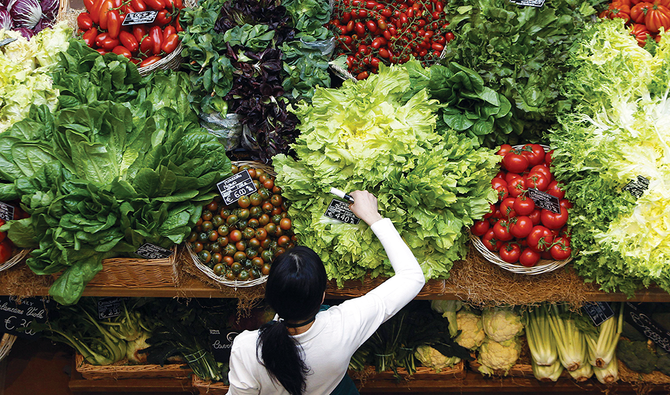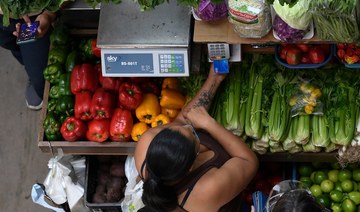LONDON: For Cleanne Brito Machado, like millions of people in developing countries around the world, shopping for staple foods such as rice, beans, oil or potatoes now means making hard choices.
“The shopping cart is getting much smaller and we’re paying much more,” said the 41-year old, who works as a maid in Brazil’s capital Brasilia. “We’ve had to give up on little trips, visiting family at the weekend, and we haven’t been able to save any money for emergencies or to have in the bank.”
A mix of currency depreciation, rising commodity prices and coronavirus disruptions saw food inflation soar 14 percent last year in Latin America’s largest economy — the biggest increase in nearly two decades. The headline figure masks hikes in staples, such as a 76 percent jump in rice or a doubling of soy oil prices.
Other developing countries from Turkey to Nigeria also recorded double-digit jumps in food inflation. Major wheat and corn exporters such as Russia or Argentina have introduced curbs or taxes to preserve domestic stockpiles, exacerbating pressures elsewhere.
UN data showed food prices hit six-year highs in January after rising for eight consecutive months.
The unwelcome return of food price pressures has put policymakers and investors on high alert, worried what it means for inflation more broadly while economies are still reeling from the coronavirus crisis.
“Central banks will be watching the level of food prices quite carefully over the next few months because they will have to make a decision on whether to respond to this or not,” said Manik Narain, head of emerging market
strategy at UBS. Food is the single largest element of inflation baskets in many emerging markets, accounting for around half in countries like India or Pakistan compared to less than 10 percent in the US.
Rising food prices have contributed to social unrest in the past. Climate change effects are expected to exacerbate price swings and rising energy prices add to the pressure.
For those like Machado, higher food bills leaves less to spend on other goods, squeezing demand for items from travel to eating out.
Many countries have already seen hard currency revenues from sectors such as tourism crater and they lack the capacity of their richer peers to pump in stimulus.
For central banks, the temptation may be to let inflation rise and keep monetary conditions loose to support growth, say analysts.
“It is a very difficult balance — governments in emerging markets are damned if they do and damned if they don’t,” said David Rees, senior emerging markets economist at Schroders.
“As a policymaker — do you choose to support your population or choose keeping the markets happy?“
Developed economies generally see food inflation as transitory. But in developing nations, persistent food price rises in the run up to the 2008 financial crisis lifted core inflation, prompting years of interest rate hikes.
In Istanbul, food market vendor Seref Geyik says he has seen the effect of opening hours cut short by the pandemic and rising wholesale prices of fruit and vegetables.
“Consumers are leaning toward cheaper stalls, they are not looking for good quality produce,” the 53-year old said.
Relying heavily on imported unprocessed foods, Turkey saw food price rises accelerate from August, when the lira chalked up monthly losses of 5 percent or more against the dollar.
With nearly all its energy also imported, rising energy prices from early November have added to the pressure. Dry weather has meanwhile hampered production of some local crops, from hazelnuts and chestnuts to apricots and olives.
Turkey’s experience of chronically high inflation two decades ago is a cautionary tale of how price pressures can derail economic growth and shatter household and investor confidence.
























